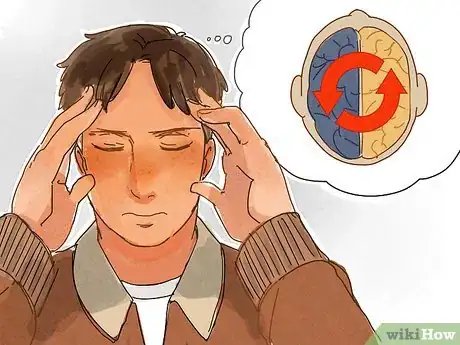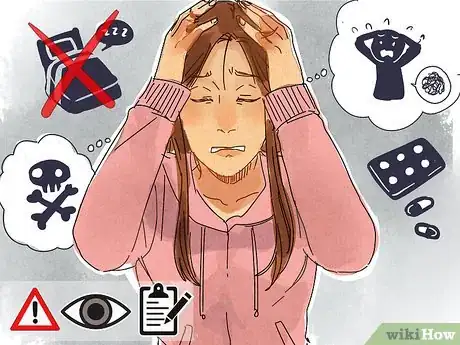This article was co-authored by William Gardner, PsyD. William Gardner, Psy.D. is a Clinical Psychologist in private practice located in San Francisco, CA’s financial district. With over 10 years of clinical experience, Dr. Gardner provides individually tailored psychotherapy for adults using cognitive behavioral techniques, to reduce symptoms and improve overall functioning. Dr. Gardner earned his PsyD from Stanford University in 2009, specializing in evidence-based practices. He then completed a post-doc fellowship at Kaiser Permanente.
There are 14 references cited in this article, which can be found at the bottom of the page.
This article has been viewed 14,481 times.
If you have bipolar disorder, the loss of someone or something important to you can throw you out of your routine and make you more vulnerable to mood swings, especially depression. To stay healthy and safe, it’s important to keep managing your mental health while you work through your grief. You can get through this emotionally tough time by seeking social and medical support, continuing to use your regular coping strategies, and keeping a close eye on your mood.
Steps
Getting Support
-
1Talk to your therapist. If you regularly attend therapy sessions, tell your therapist how you’re feeling. They will be able to help you find ways to keep your mental health under control while you grieve. If you’re not currently in therapy, consider making an appointment with a grief counselor.[1]
- Your therapist might help you come to terms with your grief by processing your feelings or performing rituals that help you mourn the person or thing.
-
2Share your feelings with friends and family. Now, more than ever, it’s important to connect with your loved ones. Schedule visits with family members and friends, or pick up the phone for a chat. Talking through your emotions can help relieve the burden of your grief.[2]
- Don’t isolate yourself, even if you don’t feel like going out or talking to anyone. Isolation will only make it easier for your mood to spiral out of control.
Advertisement -
3Check in with your doctor frequently. Make sure your doctor knows what’s going on in your life, and keep them updated on your state of mind. If you notice your mood shifting towards either mania or depression, let your doctor know right away.
-
4Ask for help. Getting things done is harder when you’re dealing with both grief and bipolar disorder, so give yourself permission to ask for help when you need it. Your friends, family, and medical team may be able to help you manage practical concerns as well as your mental health.[3]
- Help your friends and family know how to help you by making clear, direct requests.
- For instance, you could ask a friend to help you cook some healthy meals to store in the freezer.
- You may want to reach out to your local chapter of the Depression and Bipolar Support Alliance for support, advice, and other resources.
Using Coping Strategies
-
1Be gentle with yourself. Now is not the time to take on any major new responsibilities or to expect perfection from yourself. Accept that grieving is a hard process, and make your mental and emotional health your top priority right now.[4]
- Don’t try to put a time limit on your grieving. Some people get over grief in a matter of months, while others need years to recover.
- Try to reduce stress in your life wherever possible.
-
2Learn about grief. Familiarize yourself with the five stages of grief, and read books and articles about the different ways people deal with their grief. When you understand where your emotional reactions are coming from, you’ll feel a little more in control of your mind and feelings.[5]
- The five stages of grief include: denial, anger, bargaining, depression and acceptance. However, they may not go in that order for you.[6]
- One of the most important things to understand about grief is that the healing process is a little different for everyone. Your experience may not match other people’s experiences.
-
3Stick to your daily schedule. Continue to have meals, exercise, and go to work at the same times every day. At first, you might feel like you’re just going through the motions, but maintaining your schedule will help you keep your mood stable over time.[7] This sense stability is important your long-term health and well-being.
-
4Get the right amount of sleep. Try to sleep for seven to nine hours every night. Get up and go to bed at the same time every day, even on the weekends.[8]
- If you have insomnia or are sleeping more than usual, tell your doctor right away. This could be an early sign of a mood episode.
-
5Maintain healthy habits. Continue to exercise and eat healthy foods, even if that’s the last thing you feel like doing. Take all of your prescribed medication every day. Avoid drinking alcohol or consuming caffeine, since these substances can easily affect your mood.[9]
- If you have urges to use alcohol or drugs to cope with your grief, talk to your therapist about some healthier ways to manage your feelings.
-
6Tap into your spirituality. A religious or spiritual practice can give you comfort and strength as you weather your grief. Consider attending services regularly, if you don’t already. You may also find it helpful to talk about your loss with a member of clergy.[10]
- If you are not religious, consider starting a meditation practice. Regular meditation can improve your spiritual well-being and give you a sense of peace. You can find meditation groups in your area, or you can do it alone.
Monitoring Your Mood
-
1Know which symptoms signal the start of a mood episode for you. Think back to how your manic and depressive episodes typically started in the past. Be on the lookout for these symptoms, so you can catch any mood swings early.[11] doctor
- For instance, if you tend to be fatigued at the start of a depressive episode, don’t ignore any unusual feelings of tiredness now.
- You may be able to prevent a mood episode from getting out of hand if you catch it early enough.
-
2Keep a mood log. Track your moods every day, and notice whether there are any overall patterns or trends. You can monitor your moods with a notebook, printed charts, or an app.[12]
-
3Be alert for signs of depression. When you’re grieving, you are particularly vulnerable to depression. If your mood is consistently low, you feel hopeless, or you don’t want to go on living, see your doctor or therapist.[13]
- It’s normal to deal with intense negative feelings while you’re grieving. When you also have bipolar disorder, though, these feelings can easily turn into a full-blown depressive episode.
-
4Know how to recognize complicated grief. People with bipolar disorder are at increased risk for developing complicated grief. If you can’t stop thinking about your loss, refuse to accept what happened, or aren’t feeling any better after several months, let your doctor or therapist know.[14]
- Typically, if your grief lasts for more than six months, it is a form of complicated grief.
- Someone with complicated grief remains mentally stuck in a state of intense sadness or anger.
- Therapy is usually necessary for someone to heal from complicated grief.
-
5Call your doctor or therapist if your symptoms get worse. If you think you’re entering a state of mania or depression, contact someone on your medical team immediately. Don’t wait and hope your symptoms go away. Bipolar mood disturbances and grief can feed off each other if left unaddressed.[15]
References
- ↑ https://www.nhs.uk/mental-health/feelings-symptoms-behaviours/feelings-and-symptoms/grief-bereavement-loss/
- ↑ https://www.helpguide.org/articles/bipolar-disorder/bipolar-support-and-self-help.htm
- ↑ https://my.clevelandclinic.org/health/diseases/17843-mood-disorders
- ↑ https://www.washington.edu/counseling/resources/resources-for-students/healthy-grieving/
- ↑ William Gardner, PsyD. Clinical Psychologist. Expert Interview. 25 July 2019.
- ↑ William Gardner, PsyD. Clinical Psychologist. Expert Interview. 25 July 2019.
- ↑ https://familydoctor.org/condition/bipolar-disorder/#questions
- ↑ http://www.bipolar-lives.com/bipolar-sleep.html
- ↑ https://www.helpguide.org/articles/bipolar-disorder/living-with-bipolar-disorder.htm
- ↑ https://bdwellness.com/life-areas/spiritual/
- ↑ https://www.nhs.uk/mental-health/conditions/bipolar-disorder/symptoms/
- ↑ https://www.bipolaruk.org/FAQs/track-your-mood-diary
- ↑ https://psychiatry.org/patients-families/depression/what-is-depression#section_0
- ↑ https://www.psychologytoday.com/blog/get-hardy/201309/about-complicated-bereavement-disorder-0
- ↑ https://my.clevelandclinic.org/health/diseases/17843-mood-disorders










-Step-7.webp)











-Episode-Step-22.webp)




















































Medical Disclaimer
The content of this article is not intended to be a substitute for professional medical advice, examination, diagnosis, or treatment. You should always contact your doctor or other qualified healthcare professional before starting, changing, or stopping any kind of health treatment.
Read More...